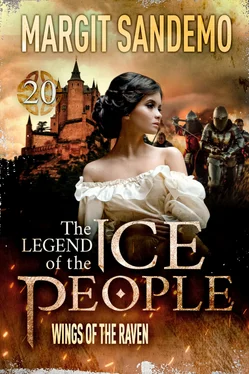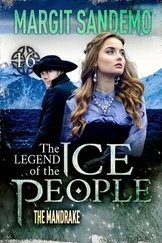As the hooves of the two Frenchmen’s horses clopped on the cobblestones, all conversation ceased. All faces turned towards the two new arrivals.
The baron and Yves had seen many colourful traditional costumes on their journey through Europe, but everyone here was gloomily dressed. Black on black, with a dash of brown and a few earthy colours here and there on waistcoats and shirts. The wives were so swathed in black that only their severe, worn faces were visible beneath their many layers of scarves. The faces and bodies of the men looked like petrified wood.
They could see only a handful of men. Most of the people in the square were women.
The two French noblemen brought their horses to a halt and ran their eyes over the crowd. Silence hung heavily over the square as the two parties scrutinized one another. Twilight had fallen surprisingly fast.
“You, there.” The baron imperiously addressed a man whom he judged to be the innkeeper because he was wearing a large apron about his stout body. “Come here!”
Reluctantly, the man obeyed him.
“Do you speak German?” the baron roared, in the belief that the only way you could get through to such people was by speaking to them in a commanding tone.
The innkeeper shrugged his shoulders. Since no one else responded, the baron concluded that only the local language was spoken here. So he would have to make do with gesticulating forcefully. To get board and lodging. Just for a single night.
It seemed that his gestures were understood and that they could get a room and food.
But Yves did not care for the snide little smile he glimpsed on the face of one of the men standing nearby.
“Can you tell us how far it is to Klausenburg?” the baron asked.
“Cluj,” Yves corrected him.
“Yes, of course, Cluj.”
The baron repeated the name of the town in a quizzical tone as he flung his arms around.
The farmers looked at one another and remained silent.
“Hermannstadt?” the baron attempted.
“Sibiu,” Yves corrected him.
“Yes, yes, Sibiu, then,” his uncle snorted hotly. “Tell me, is it me or you who’s having this conversation?”
Yves was silent. In the meantime, the name of Sibiu had struck a chord with the gathering. The Frenchmen heard some of them mumbling “Nagyszeben”, which was the Hungarian name for Sibiu, or Hermannstadt, as the Germans called it.
“Are you Hungarians?” the baron asked, surprised, for he thought that they had come farther east.
They shook their heads.
“But is Sibiu Hungarian, then?”
“No, German,” the innkeeper answered in his own language, but the Frenchmen understood his words.
Yes, that was also what they had heard: that Sibiu was largely German, that it had been founded by Germans many centuries ago. And that large areas of Siebenbürgen were populated by Magyars but not as far west as here. It also seemed the villagers knew where Sibiu was, for they were now all talking at once. With large, extensive gesticulations ...
Through words and gestures it became apparent that it was a long way to Sibiu and that the two Frenchmen would have to turn around and go back the way they had come. What they were to do after that was unclear.
The baron asked them about the possibility of just going on through the valley.
He had to repeat the question in various different ways before getting an answer.
“Târgul Stregesti.”
The baron gave his nephew a confused look. “Târgul means village, that much I know at least. But it seems that there is also something else called Stregesti.”
“Yes, perhaps it is a castle or a lake.”
“There are no lakes here. And I can’t see any castles either. But the fact is that they only use the term târgul when they want to distinguish between the village and something else.”
“It could be the forest or the river that runs past here. Well, shall we go into the inn?”
At that very moment the sound of horses’ hooves could be heard and the rattle of approaching wheels. Everyone’s gaze darted towards the street as a large coach swung into the square. People got up to pay reverential greetings. The Frenchmen eventually dismounted from their horses.
The black-clad coachman was scrawny and pale, nothing but skin and bones. The curtain in the closed carriage was drawn back and a veiled woman peered out.
The coachman climbed down and opened the door for the woman. The baron and Yves were so eager to see who it was stepping out of the carriage that they didn’t notice the villagers quietly disappearing from the square. When they finally noticed, only the innkeeper was left and he didn’t look too pleased with the situation.
The Frenchmen were interested only in the two ladies who stepped out of the carriage. One of them lifted her veil with an elegant movement of her hand, revealing an exceptionally beautiful, typically Slavic face. She was about forty years old and clearly used to ruling and commanding others. Her silky hair glistened black like birds’ wings and her eyes were worthy of the Song of Solomon.
Her companion was hardly more than a girl, with a shy, almost fearful expression in her dark eyes. It was clear that the two were related: they had the same colouring and the same beautiful facial features. But it was also clear that the older of the two dominated the younger one fully and completely. Yes, Yves actually got the impression that the sweet young girl’s eyes were desperately begging him for help.
This awakened his French chivalric instincts.
The commanding woman approached the innkeeper. “Zeno, I see that we have visitors. Won’t you introduce us?”
The innkeeper looked confused. The baron, though he had not understood the words, still grasped their meaning. He turned towards her as he bowed politely and said in German, “Madame, we have only just arrived and this good gentleman here does not yet know our names. Please allow me to introduce us. We are French noblemen. My name is Baron de Conte and this is my nephew, Yves. We are at your service, Madame.”
To the baron’s astonishment, she answered him in his native tongue. “Oh, Frenchmen! This is a most fashionable visit to receive in this out-of-the way valley. Gentlemen, I am Princess Feodora, daughter of the voivode of this region, and this is my kinswoman, Nicola. Have you already found accommodation at the inn?”
“Yes, Princess,” answered the baron, relieved at not having to continue speaking in his poor German.
“Well, then, let us not disappoint the good man. But tomorrow you must come and visit us. You just follow the same road that we came on.”
They followed her gaze towards the end of the valley farthest from them and thanked her warmly for the invitation. They agreed on a time and the ladies excused themselves because they had a few errands to do. The carriage rolled away.
A little later the two noblemen had been served with food and wine in the inn and had retreated to a plain and old-fashioned, but clean and decent room. They went to bed and lay listening to the great silence of the mountains.
“Did you notice anything in the taproom, Yves?” the baron asked.
Yves, who had just fallen asleep, started and answered drowsily, “No, what was it?”
“I mean, we’ve travelled a lot now in these eastern regions of the Habsburg Empire and how often have we not seen evidence of their superstitions?”
“Oh, yes,” Yves said. “Now I see what you mean, Uncle. Those garlic wreaths that invariably hang in every parlour as protection against vampires. There were none of them here!”
“Exactly. At least no more garlic than a cook normally has hanging by the hearth. What can we conclude from this?”
“That we need not fear vampires!” Yves laughed.
Читать дальше












